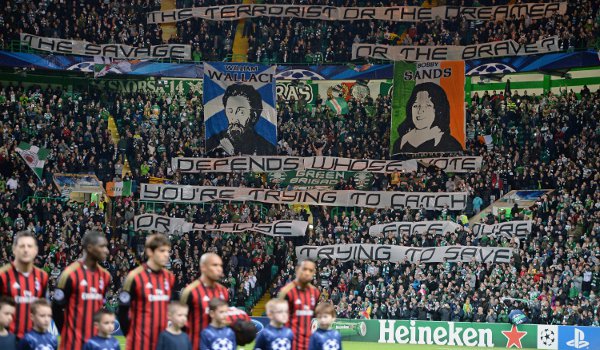AN Irish rebel song commemorating the IRA hunger strikers has sparked outrage after the BBC played a clip of it in its Radio 1 Top 40 countdown yesterday.
Unionists in Northern Ireland were outraged after hearing The Roll of Honour on the national radio station and have called for the song to be banned.
The ballad, written and performed by the Irish Brigade entered the official top 40 at number 33 following a campaign by Celtic football fans opposed to anti-sectarian football legislation introduced by the Scottish Government.
The song expresses anti-establishment anger through lyrics which brand England “a monster” and laud Bobby Sands – the IRA member who died in the Maze Prison in 1981 while refusing food – as “gallant”.
Celtic fan group, Fans Against Criminalisation, asked the Irish Brigade to re-release the song to highlight their opposition to the Scottish Government’s Offensive Behaviour at Football and Threatening Communication (Scotland) Act.
 The Green Brigade's controversial display at Celtic Park
The Green Brigade's controversial display at Celtic ParkLast night, the Democratic Unionist MP Gregory Campbell said that the BBC had a duty as a public service broadcaster to refrain from broadcasting material promoting terror and wants the song to be banned.
He said: “If the BBC was faced with any other song that commemorated murder, and on occasions multiple murders of innocent people, they would take an executive decision not to promote such a recording.”
In response a source at the BBC said: “We believe it would be wrong to ban the song outright as free speech is an important principle and a ban would only give it more publicity.”
Radio 1 presenter Jameela Jamil only played the instrumental intro of The Roll of Honour and the first two lines of the song. As has been BBC policy with such controversial songs, she did not play the song in full.
A statement for The Irish Brigade said: "It was an honour and privilege to be asked by Celtic Fans against Criminalisation to permit them to promote the song to aid the funding of their campaign against the law that affects everyone with Irish roots or a love of Irish culture.
"Neither is the song a sectarian song. It is an historic, social commentary about one stage in a long freedom struggle that is still continuing but that now uses democratic paths and institutions that did not exist in the early 80s."

